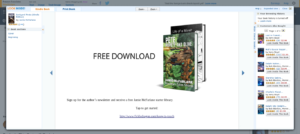(originally posted 3/12/2020)
Being a successful author takes a lot of hard work and marketing effort. But the good news is, there are a few best practices you can follow to guide your success. Let’s talk about five things you can do to achieve success as an indie author.
1. Grow Your Mailing List
I’m sure you’ve heard that an email list is one of your biggest assets as a self-publisher, and it’s well worth repeating. If you don’t have an email list–or don’t put effort into your email list–you’re leaving money on the table. Without an email list, you have to start your marketing efforts from scratch with every book you release.
When it comes to building an email list, there are a few routes you can take.
For those who are getting straight into self-publishing, you can grow your email list from book sales. Create a lead magnet for people who sign up to your mailing list, call it out as an exclusive offer in the back of your book, and then link to it. Depending on your reading platform, all links in Kindle books are completely clickable.
What’s a lead magnet? It’s a freebie that will get your engaged readers to sign up to your mailing list. For self-publishers, popular lead magnets include free books, additional character information, prologues or epilogues, and images related to the book’s settings or characters. Non-fiction authors will often put together a free eCourse to serve as lead magnets.
Here’s an example of a lead magnet in action. In his Sci-Fi book, Junkyard Pirate, Jamie McFarlane includes a link to sign up for his newsletter and receive a free book.

There are a bunch of great tools you can use to grow your list. Personally I like all the Newsletter Ninja resources by Tammi Labrecque as they’re focused on author email lists in particular. She has a book, audiobook and a few courses that can help any author build their list.
2. Market Your Books. Don’t Just Click Publish.
Amazon is home to a gajillion books. If you want yours to actually get read, you need to do some marketing.
Remember, not all marketing has to be paid! Amazon Ads and Facebook Ads are awesome and can generate great profits, but there are free ways you can market your work. Here are some of my favorite free and paid ways to spend your marketing hour beside Facebook and Amazon ads.
- Bookfunnel (Paid) Sales funnels for books and a great way to streamline distribution processes.
- StoryOrigin (Free–for now) A great way to connect with other authors for collaboration and cross-promotion. You can check out more here.
- Facebook Groups (Free) Groups, like Mark Dawson’s SPF community or 20Booksto50K, are a great way to meet other authors in your niche
- Sending emails (Free) We’ve spoken about email marketing already here. You can spend several of your monthly sessions on growing your mailing list.
- Co-marketing and networking (Free) Reach out to other authors in your genre! Read and comment on their blog, comment on their Instagram posts and send emails. You want to work with other authors, not against them.
- Social Media (Free) You can use a scheduling tool like Buffer for social media posts to make it less time consuming.
You can also check out my list of over 100 free and paid book promotion sites for more information.
3. Keep Writing Books
While I see some authors so focused on writing that they never market, I see others who are so committed to marketing one book that they forget to keep writing more!
Keep writing more books. Your value per customer increases by having more books available in the store. That’s why there’s so much value in writing books in a series, rather than one-off titles.
When an author writes a series of, let’s say five books, and promotes the first, the tables turn. You might pay $0.70 in ads for a customer to buy a $2.99 ebook. But with a series, you’re paying $0.70 for a customer to buy the first in a five-book series. It’s likely that a percentage of people who read the first book in the series will read the second, a smaller will read the third, and so on. It adds up.
By writing more books–especially in a series–you’ll be able to run more profitable ad campaigns.
4. Don’t Compare Your Success to Another Author’s
One of the most important mental hurdles you’ll have to jump as an author is to not compare your results and sales to other authors’.
You and the authors you’re comparing yourself to are at completely different stages of your careers, and you all have unique circumstances outside of writing. Instead, focus on your progress and compare your results to what you’ve done in the past. As long as you’re progressing and still publishing, you’re doing well.
Facebook groups for authors can be a great place to connect and commiserate when you’re looking for encouragement. That said, sometimes interacting with other authors can lead to the very comparisons we’re trying to avoid. So remember, we see other people’s highlights, not their blooper reels. Not many people talk about the books that didn’t sell well and the setbacks they’ve faced.
I also recommend The One Thing by Gary Keller. It’s a great book that can give you some clarity on setting healthy goals so you don’t get stuck comparing yourself to other authors’ successes.
5. Understand that Self-Publishing is Not a Get Rich Quick Scheme
You’re an author. You probably like similar Facebook pages to me and visit the same websites. That means you probably get the same online ads talking about how “easy” it is to make money online and quit your full-time job.
The truth is, being a self-published author is hard. You need to write even when you don’t want to. And to be truly successful, you need to put in a lot of work over a long time. And even then, like anything, there are no guarantees. But that isn’t to say that you can’t go full-time with your writing. There are plenty of authors who have accomplished it in the past and more will do it in the future.
I guess what I’m trying to say is don’t quit just because success doesn’t come quickly. You might be closer than you think to a breakthrough.
Cheers!
**
Dave Chesson is the founder of Kindlepreneur.com and creator of Publisher Rocket, a software that helps authors market their books more effectively.
Twitter: https://twitter.com/DaveChesson
Facebook: https://www.facebook.com/KindlePreneur/
Photo by Carl Heyerdahl on Unsplash
